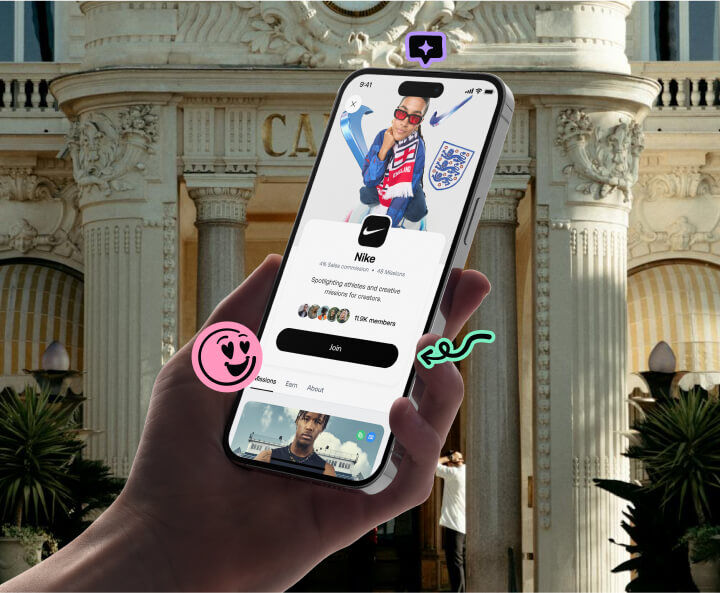Influencers vs brand affiliates vs advocates vs ambassadors: Choosing the right strategy for your brand
 Influencers vs brand affiliates vs advocates vs ambassadors: Choosing the right strategy for your brand">
Influencers vs brand affiliates vs advocates vs ambassadors: Choosing the right strategy for your brand">

Each role has a unique part to play in marketing strategies, with distinct strengths and ideal use cases. For brands, understanding the differences is crucial to selecting the right strategy that aligns with specific goals, budgets and target audiences.
In this guide, we’ll dive into each role and explore the benefits and drawbacks of each to help you decide which type of brand representative might best suit your business needs. Whether you’re seeking increased brand awareness, sales growth or authentic connections with your audience, choosing the right type of partnership is key.

Which brand marketing strategy fits your goals?
As your brand evolves, choosing the right type of representative becomes essential to amplifying your voice and achieving your unique marketing goals.
Different types of brand representatives – influencers, affiliates, advocates and ambassadors – offer distinct advantages. Selecting the right strategy can enhance brand awareness, drive sales, build trust and increase online engagement.
Each type of representative brings a unique approach to promoting your brand, so it’s important to consider what aligns best with your objectives.
Do you need rapid exposure to a wide audience? A direct increase in conversions? Or are you looking to create long-term relationships with loyal advocates who embody your brand’s values?
Let’s explore the roles of influencers, affiliates, advocates and ambassadors to help you determine which approach will most effectively support your brand’s growth and help you reach your marketing goals.

What is a social media influencer and how could they benefit your brand?
Influencers have taken the marketing world by storm over recent years. An influencer is typically a well-known figure with a large social media following who partners with brands for paid collaborations. These partnerships often involve content creation, such as product reviews, tutorials or event promotions to increase brand visibility and create buzz.
Influencer partnerships are usually short-term and transactional. The brand provides compensation (through set rates, commissions, free products or other incentives like trips) in exchange for being featured on the influencer’s social media platforms.
Influencers often collaborate with multiple brands, making them versatile but sometimes less brand-dedicated representatives.
The benefits of using influencers
- The high follower counts of influencers enable the potential for wide exposure for your brand.
- Genuine influencers lend credibility to your brand and can influence their audience’s decision-making process.
- May offer cost-effective exposure compared to traditional ads.
- Content created by influencers can double as user-generated content (UGC) for future use.
The downsides of using influencers
- Influencer marketing costs have risen significantly over the last few years with mega influencers (500,000 followers) charging upwards of $10,000 per post according to Shopify.
- Audiences are smart and can increasingly recognise insincere endorsements, leading to scepticism.
- Frequent brand partnerships can dilute an influencer’s authenticity, which has an impact on your brand if you choose to work with influencers.
- Influencers with larger followings typically have more negotiating power and charge more.
- A high follower count doesn’t guarantee high engagement. In fact, micro and nano influencers often enjoy a higher engagement rate.
You may want to bring social media influencers on board if…
- You have a large marketing budget and are looking to scale awareness quickly.
- Your brand already has substantial recognition, making it attractive to top influencers.
- Your goals focus more on impressions and brand recognition than conversions.
- You want to tap into a new target market.
What is a brand affiliate and how could they help you reach your goals?
Brand affiliates are content creators who promote your brand in exchange for a commission on sales generated through their unique affiliate link. Unlike influencers, who are paid upfront, affiliates earn income based on performance, making it a cost-effective model for brands focused on direct sales.
Affiliates often create long-form content, such as blogs, vlogs and review articles, which they share across platforms or websites. Successful affiliates may promote dozens of brands within their niche, offering a valuable avenue for driving sales through focused content.
Affiliates frequently find brands via affiliate programs on platforms like Commission Junction or directly on eCommerce sites.
The benefits of using brand affiliates
- Cost-effective, as affiliates are commission-based
- Generally requires less hands-on management than other forms of brand partnerships.
- Affiliates often have expertise in SEO, driving organic traffic to your brand.
- High-quality affiliates can yield substantial sales with minimal brand involvement.
The downsides of using brand affiliates
- Limited control over content quality and message.
- May promote competitors or multiple brands within the same space which can dilute your brand’s impact.
- Attracting affiliates may require campaigns to raise awareness of your program.
- Low-ticket items often attract fewer affiliates due to lower commission potential.
- Some affiliates may promote your brand without firsthand experience using your product which can result in less authentic content.
You may want to bring brand affiliates on board if…
- You have a high-ticket product with an attractive commission rate.
- Your primary objective is to drive sales rather than boost brand awareness.
- You prefer a hands-off approach, without needing to manage regular tasks and content.

What is a brand advocate and what role do they play in marketing?
Brand advocates are the ultimate organic ambassadors. A brand advocate is anyone who loves your product and voluntarily promotes it, sharing genuine endorsements on social media, in reviews or through word of mouth without compensation. Advocates are loyal fans, often producing content as a natural extension of their brand loyalty.
Brand advocates are not required to have large followings. They may simply be regular consumers who sing your praises in their own circles, lending your brand unparalleled authenticity. Advocates create “free” publicity and, with the right encouragement, can become powerful drivers of brand reputation.
The benefits of using brand advocates
- Completely organic promotion, requiring no incentive.
- Highly trusted, authentic content.
- Advocates naturally generate positive brand sentiment.
- They can be great candidates for ambassador programs if approached through an activation campaign.
- Advocates with large followings can boost reach without added cost.
The downsides of using brand advocates
- Limited control over frequency, content quality or accuracy of posts.
- Hard to track and measure impact without an official partnership.
- Less influence over continued loyalty, as they can shift to competitors.
You may want to bring brand advocates on board if…
- You are seeking organic growth and have strong customer satisfaction.
- Your goal is to build brand trust and credibility.
- You’re open to identifying and recruiting advocates for structured ambassador roles in the future.

What is a brand ambassador and can they help grow your brand?
Brand ambassadors are dedicated representatives who partner with brands over an extended period, typically through a structured ambassador program. Unlike short-term influencers or one-off affiliates, brand ambassadors form lasting relationships with the brands they endorse.
They often start as loyal customers or passionate brand advocates who have shown enthusiasm for a company’s products or services.
Recognising their genuine support, brands invite these individuals to join an official ambassador community, where they receive ongoing incentives – like exclusive discounts, gifts, early access to products and sometimes even monetary compensation – in exchange for promoting the brand regularly on their social media platforms.
Brand ambassadors tend to have smaller, niche followings, which often translates to higher engagement rates. This allows them to interact more deeply with their audience, building a level of trust and authenticity that resonates strongly.
Their content feels genuine because their audience knows that these ambassadors truly believe in the products they represent. Typically, ambassadors collaborate with a select few brands they are genuinely passionate about, which helps avoid the dilution of their endorsements and adds credibility to their advocacy.
This consistency not only aids brands in achieving steady growth but also helps establish a positive reputation as ambassadors act as relatable, trustworthy voices within their communities.
Through frequent, high-quality posts, UGC, and a personal connection with their followers, brand ambassadors contribute to long-term brand loyalty and heightened visibility. As a result, they play a critical role in boosting brand awareness and credibility, driving sales and building community among current and prospective customers.
Brands benefit not only from the ambassadors’ reach but also from a steady stream of organic content that can be repurposed across marketing channels, making brand ambassadors a valuable asset for sustainable growth.
Pros of using brand ambassadors
- Ambassadors generate consistent UGC that can be repurposed for future campaigns.
- There is high ROI potential with a structured ambassador program.
- Brands maintain greater control over content through specific tasks or missions.
- Ambassadors create long-term brand affinity, leading to higher customer retention.
- A scalable community of ambassadors allows brands to amplify their reach over time.
Cons of using brand ambassadors
- Running a program requires dedicated time, personnel and financial resources.
- Smaller audiences mean that you may need more ambassadors to achieve the broad reach you’re looking for.
- Starting from scratch requires an initial investment in brand visibility to attract ambassadors.
- Managing a community manually can be time-consuming.
You may want to bring brand ambassadors on board if…
- You’re a mid-to-large brand looking for consistent engagement, brand loyalty and UGC.
- You have a team or platform in place to manage ambassador relationships.
- You’re prepared to offer rewards that provide value to ambassadors.
- Your brand is focused on a community-driven, long-term growth strategy.
How to choose between social media influencers, brand affiliates, brand advocates and brand ambassadors
Choosing the right representatives for your brand requires a clear understanding of your goals, budget and audience. Here’s a brief comparison to help guide your decision:
- For brand awareness: Social media influencers and brand affiliates are great options if you need immediate visibility. Influencers do extremely well in reaching large audiences, while affiliates can drive awareness through SEO-optimised content, driving more ideal clients to your website.
- For sales conversions: Brand affiliates are highly effective for driving direct sales, especially if you have high-ticket items. Brand ambassadors, with their loyal communities, can also drive conversions over time with their consistent UGC.
- For authentic representation: Brand advocates and brand ambassadors provide authentic content that can boost trust and engagement. Advocates generate organic buzz, while ambassadors allow for more structured, ongoing campaigns.
- For long-term growth: Brand ambassadors are ideal for brands focused on sustained growth, UGC and increased customer loyalty. Building a community of ambassadors creates a steady stream of content and brand representation.

4 tips for avoiding common mistakes with brand representatives
No matter who you choose as representatives for your brand, to make the most of this partnership, avoid these four common pitfalls:
- Misaligned partnerships: Only choose social media influencers, brand affiliates or brand ambassadors whose values genuinely align with your brand values. Authentic representation is crucial to building long-term relationships.
- Lack of clear guidelines: Provide clear guidance while not limiting creative freedom, especially for influencers and affiliates. Ambassadors should be encouraged to add their personality to their content while following brand expectations.
- Underestimating ROI potential: Ensure you’re compensating your representatives fairly, as low or infrequent rewards can lead to disengagement.
- Neglecting engagement: Especially with ambassadors and advocates, regular engagement is essential. Maintaining communication fosters loyalty and increases the chances of brand representatives continuing to advocate for you.

Building the right brand representative strategy
Each brand representative type – brand affiliates, social media influencers, brand ambassadors and brand advocates – offers unique strengths that can benefit your marketing strategy.
From the broad reach of influencers to the sales-driven model of affiliates, the organic support of advocates and the loyal engagement of ambassadors, selecting the right type (or mix) depends on the unique marketing goals of your brand.
Whether you’re a small business seeking hands-off affiliates to drive sales, or an established brand looking to cultivate a robust ambassador community, choosing the right strategy and providing your representatives with fair incentives and guidance will build a foundation for lasting success.
As you continue to grow, you may find that a combination of all types brings the best results, maximising brand visibility, engagement and revenue across channels.
Are you ready to start working with marketing brand ambassadors? Let’s get started!
Keep up with the
latest from Club

Get more inspiration

What makes a good brand ambassador? 6 essential traits for success


Marketing brand ambassadors: What is ambassador marketing and why it works


7 best practices to build an effective brand ambassador program


 Book a demo
Book a demo

